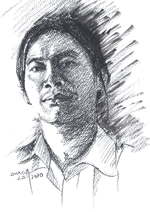Farewell to a Revolutionary, Good Riddance to a Despot
News of the deaths of Vaclav Havel and Kim Jong Il hit Burma at high speed this week, and many Burmese rushed online to share their thoughts about the leader of the Czech people, who they admired, and the oppressor of the North Korean people, who they disdained.
It is predictable that many Burmese commentators paid tribute to Havel—the hero of the “Velvet Revolution” is a true friend of Burma and an inspiration to its people.
In contrast, the Burmese Facebook community likened Kim Jong Il to that of the equally elusive Burmese despots, including previous junta chief Snr-Gen Than Shwe, who is still believed to be wielding power from behind the scenes.
“Kim is gone and the day of Shwe is coming soon,” wrote one person on Facebook.
 |
| Aung Zaw is founder and editor of the Irrawaddy magazine. He can be reached at [email protected]. |
Havel, the former Czech president, was a dissident, playwright, political rock star and staunch supporter of Burma’s democracy movement. As a result, he established a strong connection to the repressed Burmese people and democracy icon Aung San Suu Kyi.
There are many events that stand out when reminiscing about Havel’s ties to Burma. In 1991, he was the one who proposed that Suu Kyi be awarded the Nobel Peace Prize while she was under house arrest. Suu Kyi won the prize, and Havel continued the campaign to free her and the Burmese people from the rule of its military dictators.
In 2005, Havel and Archbishop Desmond Tutu initiated the “Threat to Peace,” a report calling for UN Security Council action on Burma. And as recently as Dec. 11, just weeks before his death, Havel joined His Holiness the Dalai Lama and several other distinguished leaders in issuing the Prague Declaration, in which they did not forget to mention Burma.
In one paragraph, the declaration stated: “Of equal importance for the international community is to encourage the signs of cautious change in the right direction in Burma. It is crucial that the international community adopts effective policies that encourage a meaningful and result-oriented dialogue between the Nobel laureate Aung San Suu Kyi and the Burmese authorities.”
As far back as the 1960s and 1970s, many Burmese students went to study in the former Czechoslovakia, with some taking refuge there and remaining ever since. Even now, the Czech Republic takes in Burmese refugees and provides assistance and protection to several prominent Burmese exiles.
Havel and his Czech Republic never swerved in their support for Burma. Despite the fact that the Czech nation is small and needs new economic partners even more than its richer Western neighbors, it played a role in shaping EU Burma policy and continued to support the Burmese people and highlight their plight.
In contrast, Kim Jong Il was a tyrant and extremely dangerous person who starved his own people, threatened the security of the Asia-Pacific region and supported his cohorts in crime in the Burmese military regime.
In the 1970s, the North Korean hermit kingdom forged a formal diplomatic relationship with Burma’s then socialist regime when Kim Jong Il’s father, Kim Il Sung, was head of state.
That friendship didn’t last long, however, because in 1983 North Korean agents snuck into Burma and attempted to assassinate visiting South Korean president Chun Doo-Hwan in Rangoon, killing several visiting South Korean ministers in the process.
As a result, the Burmese government hunted down the terrorists and cut diplomatic relations with North Korea. But the next Burmese military regime, which came to power through a bloody coup in 1988, secretly renewed their country’s severed ties with North Korea as early as 1999.
Afterwards, North Korean ships sailed into Burmese ports to deliver military hardware and it is alleged that Burma was actively seeking nuclear technology from Pyongyang.
In 2007, the two governments formally restored their diplomatic relationship despite the fact that Pyongyang never formally apologized for the 1983 bombing.
1 | 2 next page »
|
||
|
||
|
||
|
||
|
||
|
||
|
||
|
||
- Sizing Up an Icon
- Fighting Corruption Begins at Home
- Future of Exiled Burmese Media
- How Much Freedom Does Burmese Media Enjoy?
- Five Days in Burma
- Turning Burma into Next Asian Tiger No Simple Task
- With Suu Kyi On Board, Is Burma Finally Moving Toward Real Change?
- The ‘Rule of Law’ in Burma
- New Doors are Opening in Burma
- A Good Beginning to the New Year
